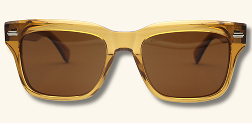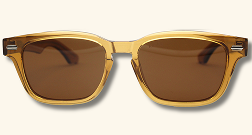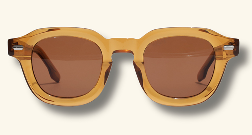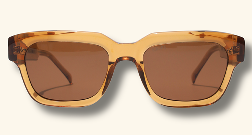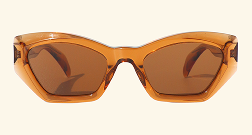What Are Polarized Sunglasses?
Polarized sunglasses are eyewear designed to reduce glare and protect the eyes from ultraviolet (UV) light. They contain specially treated lenses that are capable of blocking out horizontal light waves while allowing vertical light waves to pass through. This allows for better visibility in bright sunny conditions and reduces eye strain due to sun glare.
Can Polarized Sunglasses Be Worn Indoors Or At Night?
No, polarized sunglasses should not be worn indoors or at night. Polarized lenses reduce glare from light reflecting off of surfaces, which is helpful when outdoors in the sun. However, since indoor and nighttime environments are generally darker, there is no need for this type of protection.
How Do Polarized Sunglasses Reduce Glare?
Polarized sunglasses reduce glare by filtering out the horizontal light waves that create glare. This means that the lens blocks out reflected light from flat surfaces such as water, roads, and pavement, allowing for clearer optics in brighter environments. The lenses also provide superior contrast and color accuracy, giving a better view of your surroundings.
Are Polarized Sunglasses Better For Outdoor Activities Like Fishing Or Skiing?
Yes, polarized sunglasses are better for outdoor activities like fishing or skiing. Polarized lenses reduce glare and improve visibility, which is particularly helpful when out in the sun. They also provide protection from UV rays and block out blue light, making them an ideal choice for outdoor activities that require eye protection.
Can Polarized Sunglasses Harm Your Eyes?
No, polarized sunglasses cannot harm your eyes. Polarized lenses reduce glare, which helps protect the eyes from long-term damage and strain caused by excessive light exposure. They help reduce eye fatigue and headaches caused by bright light. As long as the sunglasses are of good quality, they should not cause any harm to your eyes.
What Should I Look For When Buying Polarized Sunglasses?
When buying polarized sunglasses, look for lenses that block 100% of UVA/UVB rays, have an anti-scratch coating, and are made of impact-resistant materials. Additionally, choose a frame that fits comfortably and securely, with good peripheral coverage. Pay attention to the lens tint since it affects the level of glare protection you will get.
How Should I Care For My Polarized Sunglasses To Ensure Their Longevity?
Keep them clean and store them properly. Regularly wipe the lenses with a soft cloth and use a mild soap-and-water solution for tougher stains. Avoid touching the lenses as much as possible to avoid fingerprints. Store them in a hard case when unused and keep them away from extreme temperatures that could cause damage.
Are There Any Downsides To Wearing Polarized Sunglasses?
Yes, there are some downsides to wearing polarized sunglasses. They can make it difficult to read LCD screens or digital devices, as the polarization blocks out the light that makes them visible. They cause a glare when looking at certain reflective surfaces like car windows or bodies of water, which can be dangerous and distracting.
Can Polarized Sunglasses Be Used for Golfing?
Yes, polarized sunglasses can be used for golfing. They help reduce glare from reflective surfaces, enhancing visibility and allowing better focus on the ball and surroundings. However, some golfers prefer non-polarized lenses to better read the greens. Personal preference and lighting conditions should be considered when choosing sunglasses for golf.
Do Polarized Sunglasses Reduce Glare?
Yes, polarized sunglasses reduce glare. They have a special filter that blocks horizontally polarized light, which is responsible for glare. This filter helps to enhance visual clarity and comfort, especially in bright conditions such as when sunlight reflects off water or snow. Polarized sunglasses are commonly used to reduce glare and improve visibility.
Are Polarized Sunglasses Suitable for Driving?
Yes, polarized sunglasses are suitable for driving. They reduce glare caused by sunlight reflecting off surfaces like the road or other cars. This improves visibility and reduces eye strain, enhancing safety while driving. However, it's important to ensure they don't interfere with any digital displays in your vehicle, as polarized lenses can affect their visibility.
Do Polarized Sunglasses Reduce Eye Strain?
Yes, polarized sunglasses can reduce eye strain. They help to block horizontal glare from surfaces like water or snow, which can cause discomfort and fatigue. By reducing glare and improving visual clarity, polarized sunglasses provide a more relaxed and comfortable viewing experience, ultimately reducing eye strain.
How to Clean and Care for Polarized Sunglasses?
To clean and care for polarized sunglasses, start by rinsing them with water. Gently wipe the lenses using a microfiber cloth, avoiding abrasive materials. Avoid using harsh chemicals, opt for specialized lens cleaners. Store them in a protective case when not in use. Regular maintenance ensures their longevity and optimal performance in reducing glare.
How Do I Know If My Prescription Sunglasses Can Be Polarized?
To determine if your prescription sunglasses can be polarized, check for a "P" or "Polarized" label on the lenses or packaging. Additionally, consult your eyewear provider or optometrist to confirm if your specific prescription lenses can accommodate polarization. They will have the necessary information and expertise to guide you accurately.
What's the Difference Between Polarized Sunglasses and Regular Sunglasses?
Polarized sunglasses contain a special filter that blocks horizontal light waves, reducing glare from reflective surfaces. They enhance visual clarity and provide better protection against harmful UV rays. Regular sunglasses, only reduce the overall amount of light entering the eyes but do not offer the same glare reduction or UV protection benefits.
Are Polarized Sunglasses Worth the Price?
Yes, polarized sunglasses are worth the price. They effectively reduce glare caused by sunlight reflecting off surfaces, providing improved visual clarity and comfort. Polarization enhances eye protection and reduces eyestrain, making them beneficial for outdoor activities and driving. Investing in quality polarized sunglasses can significantly enhance your visual experience and eye health.
Do Polarized Sunglasses Affect Color Perception?
Yes, polarized sunglasses can affect color perception. They filter out certain light waves, reducing glare and improving visual clarity. However, this filtration can also alter the colors you see, especially when looking at LCD screens or certain angles of light. Choose the right lens tint and consider the intended use when selecting polarized sunglasses.
Can Polarized Sunglasses Prevent Eye Fatigue?
Yes, polarized sunglasses can help prevent eye fatigue. They reduce glare caused by reflected light, improving visual clarity and comfort. By filtering out horizontal light waves, polarized lenses reduce strain on the eyes, especially in bright conditions. They are particularly beneficial for activities like driving, outdoor sports, and spending time near water or snow.
Are There Any Disadvantages to Wearing Polarized Sunglasses?
While polarized sunglasses offer numerous benefits, they do have a few disadvantages. They can make it difficult to view LCD screens, such as on phones or ATMs. Additionally, some individuals may experience distortion or discomfort when looking at certain surfaces, like car windshields. These drawbacks are relatively minor compared to the advantages of polarized sunglasses.
Do Polarized Sunglasses Offer UV Protection?
Yes, polarized sunglasses offer UV protection. The polarization feature reduces glare by blocking horizontal light waves, improving visual clarity. Additionally, reputable polarized sunglasses come with UV-blocking filters that block harmful ultraviolet rays. It is essential to choose sunglasses that specifically state they offer 100% UV protection to ensure adequate shielding from UV radiation.
Are Polarized Sunglasses Suitable for All Outdoor Activities?
Polarized sunglasses are suitable for most outdoor activities. They reduce glare and enhance visual clarity, making them beneficial for activities like driving, fishing, and skiing. However, they may not be ideal for certain situations, like reading digital screens or low-light conditions. It's important to consider specific needs before deciding on sunglasses for a particular activity.
Can You Wear Polarized Sunglasses Everyday?
Yes, you can wear polarized sunglasses every day. Polarized lenses help reduce glare and improve visual clarity, making them beneficial for various activities such as driving, outdoor sports, and general use. However, it's essential to ensure the sunglasses provide adequate UV protection and suit your needs and preferences.
When Should You Wear Polarized Sunglasses?
You should wear polarized sunglasses when you are exposed to intense sunlight or glare, especially in outdoor activities like driving, boating, or skiing. Polarized lenses reduce reflected light, enhance clarity, and provide better visual comfort, making them ideal for situations with excessive brightness or glare from surfaces like water, snow, or roads.
Do Polarized Lenses Offer More Protection?
Yes, polarized lenses offer enhanced protection by reducing glare and blocking harmful UV rays. They improve visual clarity and reduce eye strain, making them particularly beneficial for outdoor activities, driving, and water sports. However, it's essential to note that polarized lenses do not provide complete protection against all types of eye-related issues.
Can Heat Damage Polarized Sunglasses?
Yes, excessive heat can damage polarized sunglasses. Prolonged exposure to high temperatures, such as leaving them in a hot car or near a heat source, can cause the lenses to warp or lose their polarization effectiveness. It's important to store and handle polarized sunglasses properly to avoid heat-related damage.
Are There Specific Cleaners for Polarized Lenses?
Yes, there are specific cleaners designed for polarized lenses. These cleaners are formulated to effectively clean the lenses without damaging the polarizing film. Using regular cleaners or harsh chemicals can compromise the polarization and clarity of the lenses. It's recommended to use products specifically labeled for polarized lenses.


